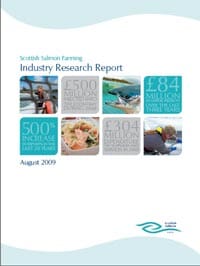Commercial salmon farming started in Scotland in the early 1970s and it has grown into a major industry located primarily on Scotland's rural margins.
In the past 50 years, the global volume of fish produced by aquaculture has risen from less than a million tonnes to 51.7 million tonnes. In 1980, only nine per cent of the fish consumed by people came from aquaculture. Recently, the UN Food and Agriculture Organisation (UN FAO) reports that it is approaching 50 per cent. The UN FAO also reports that aquaculture is the only way to meet the demand for seafood.

The objective of the project was to update existing industry statistics and to establish the relative importance of the sector to Scotland's economy and, in particular, the rural economy.
Specifically, the report examines:
- Impacts of employment in remote, rural economies
- Expenditure on suppliers and services
- Levels of capital investment
- Export demand, and
- Business confidence
Financial Contribution to Communities
From the Scottish Government's input/output tables, fish farming is behind only property letting and pension funds when it comes to multiplying the effect of income on the economy. This means that more of the money earned by those working in fish farming circulates around local communities.
Using the Scottish Government's official multiplier, the £36 million wage bill from SSPO member companies represents a value of closer to £165 million to the Scottish economy. The largest share of this distributed income is in Highland, Shetland, Argyll and Bute, Western Isles and Orkney.
* "With an ex-farm value of approximately £350 million and worldwide retail sales over £1 billion, the salmon sector is now an essential part of the economic well-being of many remote, rural economies in the Highlands and Islands." |
|
Scott Landsburgh
Chief Executive of SSPO |
Levels of Capital Investment
Over the last three years, SSPO members have invested over £84 million in capital projects. The vast majority of this (96 per cent) has been invested in the Highlands and Islands of Scotland.
Encouragingly, levels of capital investment in the industry have risen year-on- year from £19.5 million in 2006 to £35 million in 2008, as member companies prepare to meet the growing, global demand for high quality salmon.
Operational expenditure on suppliers and services was over £304 million in 2008. Over £223 million of that sum was spent in Scotland, with £143 million in the Highlands and Islands.
Export Demand
Exports in the industry have increased by over 500 per cent in the last twenty years, with companies optimistic about market demand in the next 24 months.
The overseas demand for fresh Scottish farmed salmon has been consistently high for some time, with 59 countries importing the fish in 2008. Some 52,600 tonnes (whole fish equivalent) were exported in 2008.
The percentage of the total production of fresh Scottish farmed salmon that was exported overseas in 2008 is consistent with the average over the last five years. The 2008 export figure is the equivalent of 38 per cent of total production.
* "Salmon farming development can play a major role in the sustainability of the Highlands and Islands. In market terms, the prospects for the industry are hugely encouraging. However, continued development depends crucially on maintaining investment to allow the industry to grasp its opportunities." |
|
Professor Phil Thomas
SSPO Chairman |
Employment
Of the 6,200 full and part-time jobs that aquaculture supports, SSPO member companies continue to be a major employer in remote, rural locations, providing jobs for 1,579 people in 2008.
In addition to the direct employment, it is estimated by the Scottish Government that a further 4,700 people in downstream jobs are dependent on a successful aquaculture industry.
Business Confidence
SSPO members are optimistic about future market conditions. As analysts predict a global undersupply of Atlantic salmon by as much as 190,000 tonnes in 2010 and with consumer demand constantly increasing, companies support responsible, sustainable economic growth.
Whilst continuing to emphasise quality, health, provenance and environmental sustainability, members have expressed a desire to increase production over the next five years to meet the anticipated increase in market demand for responsibly farmed Scottish salmon.
Further Reading
| - | You can view the full report by clicking here. |
October 2009


